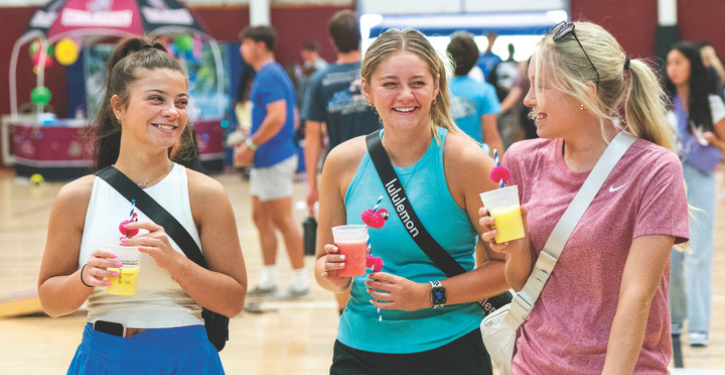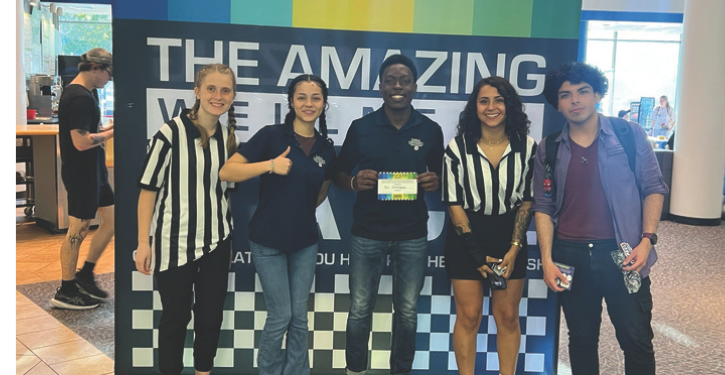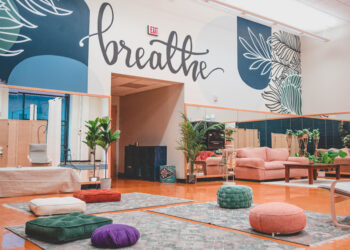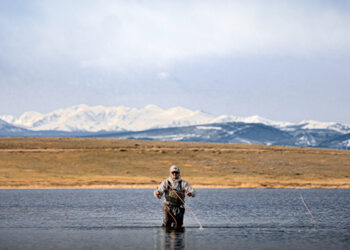When someone is experiencing poor mental health, their symptoms and behaviors can look different from others. Elisa Terry, the associate director of fitness and well-being at the University of California, Los Angeles (UCLA), hypothesized these concerns manifest in reluctance to join in-person activities and a lack of social engagement that’s been prevalent since the COVID-19 pandemic.
“Campus Recreation has always been important in addressing mental health issues,” said Terry. “Maybe now we’re just beginning to be recognized for that, but we’ve always known recreation and fitness aren’t just for the body. It’s for your mind, mental health and overall well-being. Exercising, being with others and learning new skills are good for all aspects of a human being.”
To promote the importance of mental health and its link to holistic well-being, UCLA has been thinking about theming. This year, they’re utilizing a mascot of a brain performing different activities, highlighting the link between physical movement and mental health. “We want them to make that connection in a fun and approachable way,” explained Terry. “What we really want to do is let people know we have tools and spaces to help people and have a positive effect. This is a fun way we’re brainstorming how to get that message out.”
EXTRA CREDIT: Room for Wellness Initiatives
Many campus rec departments are also turning to special programming focused on improving mental health. For example, Bellarmine University created the Relaxation Station during the COVID-19 pandemic to provide de-stressing opportunities for students. These sessions happened in a centralized location, and Campus Recreation and Wellness partnered with other offices and student clubs to provide activities including journaling, crafting and reading.
The Relaxation Stations were only meant to last for a month and a half, but students pushed for it to continue. According to Mason McGrew, the Campus Recreation and Wellness specialist at Bellarmine University, students anticipate looking for the Station around campus. “They want to see it grow and for more people to use it,” he said. “We’re helping people who are struggling evolve to reach their higher potential.”
Because the initiative is popular and had high student engagement, McGrew noted they look to improve every session. To continually meet participants’ standards, feedback is gathered on aspects like what snacks to provide, locations to host it and activities to have.
EXTRA CREDIT: Floor Changes Improve Holistic Well-Being at Towson University
Other initiatives on Bellarmine’s campus include educational programming around suicide prevention, career and occupational wellness, alcohol education, and more. With its mission reflected in its name, Campus Recreation and Wellness’ goal is always to create a welcoming space that can promote physical, social and mental health.
“People from all across campus use our facilities, but they also come to us for programming as well,” said McGrew. “It’s a great opportunity to meet students where they’re at. We play a vital part in promoting a good environment and making this a safe space for them where they can talk about these issues.”
Many vendors are also helping campus rec departments in this area, one being The College Agency and its The Amazing Wellness Race, an event that taught participants about various wellness activities. Partnering to hold unique programming like this can help you provide new and unique opportunities for students, but they can be expensive. When Campus Recreation at DePaul University hosted the race, it partnered with Student Involvement to help with the funding. The result was a great event that was different than typical wellness education programming.
“I highly recommend looking into this experience,” said Samantha Glennon, the associate director of membership and marketing of CENTERS LLC at DePaul University. “It leveraged an additional knowledge base and increased support from our community. Having those relationships are vital so you’re able to be more creative and provide higher-quality experiences and programs. They’re effective and enjoyable at the same time.”
EXTRA CREDIT: Episode 26: Moe McGonagle at DePaul University
Being an escape for students and providing a place that prioritizes wellness is a common purpose for campus rec facilities. As students deal with academic pressure, social and extra-curricular commitments, and the transition from being a teenager to adult, stress and anxiety levels rise. Destigmatizing mental health and promoting open conversations about it can help students realize the importance of holistic health.
“This cultural change is crucial,” said Glennon. “We play a critical role in addressing these concerns and providing students with an opportunity for physical activity which has been scientifically proven to improve mental health and well-being for individuals. We have the ability to continue fostering community and belonging.”
In fact, this has always been in the foundation of campus recreation, according to Glennon. However, many leaders are being more intentional with promoting and educating about mental health. New and innovative programming can increase interest, but education and destigmatization play just as big of a role in promoting change.
EXTRA CREDIT: Efficient Mental Health Initiatives and Strategies for Campus Rec
“Campus Recreation has always been a part of the foundation that supports health and well-being for everyone who participates,” said Glennon. “It’s not necessarily anything new we’re implementing that causes the most progress, but how we’re educating others. We’re showing we can have a seat at a table of experts in the field of mental health and wellness. It’s a small piece, but we do play a critical role in combatting mental health struggles on campus.”
In recognition of this, Leanne Kulchawik, the assistant director of fitness and wellness at CENTERS LLC at DePaul, started an inter-department committee to better support students’ well-being. Members come together to ensure the university is supporting students’ needs holistically and are collaborating on across-campus issues.
One result from this committee includes hosting a campus-wide event each quarter that focuses on a different aspect of wellness. In Spring 2024, DePaul hosted a Wellness Field Day filled with games, activities and information on campus services.
EXTRA CREDIT: Creating Space for Outdoor Recreation
The team consistently asks for student feedback, especially on areas of improvement for future events. The post-Wellness Field Day survey had over 100 responses with 94% of students noting they learned something from the event. Additionally, 88% of students said they were educated on how to access campus resources, including Campus Recreation, and listed the Ray Meyer Fitness and Recreation Center as a safe space.
“What’s so important about taking this data is it’s an actual reflection of your students’ experiences,” emphasized Glennon. “We can share that with upper-level administration, and they can see the positive impact these events, initiatives and campaigns have on students and are more likely to provide additional support and funding. We have to make sure we’re telling our story and how we’re a benefit to students through the qualitative and quantitative data.”
This data can be crucial when advertising for more funding. Terry emphasized the importance of acquiring financial support to eliminate as many barriers of entry as possible. By doing so, you can better support a larger portion of the student body and be a catalyst for change.
“The highlight of facilitating these programs is always seeing the outcome and change you see in people,” said Terry. “When they feel comfortable enough to engage, you see their confidence rise and they smile more without realizing why. Creating a space that is welcoming and comfortable for everyone, and helping people find joy never gets old.”












